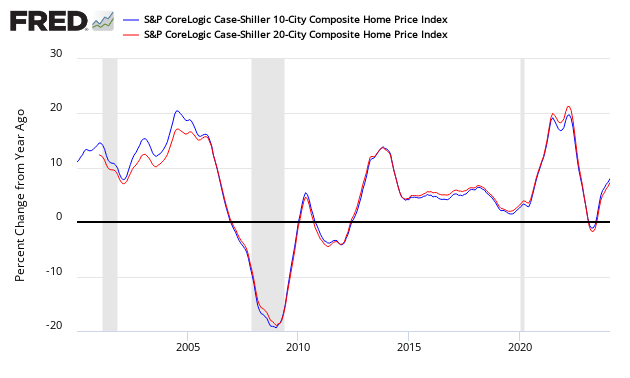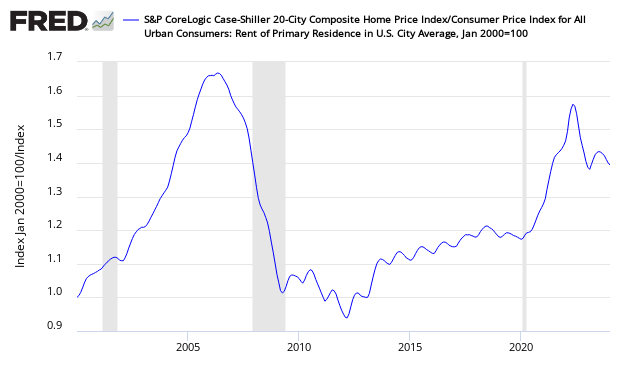Written by Steven Hansen
The non-seasonally adjusted Case-Shiller home price index (20 cities) for February 2014 (released today) rate of growth declined again slightly but showed the 21st consecutive monthly year-over-year gain in housing prices since the end of the housing stimulus in 2010.
- Home price rate of growth decelerated 0.3% month-over-month.
- Home prices increased 12.9% year-over-year (20 cities).
- The market had expected a year-over-year increase for the 20 city non-seasonally adjusted index of 13.2% to 14.0% (consensus 13.3) versus the 12.9% reported.
- Case-Shiller continues to show the highest year-over-year home price gains of any home price index.
S&P/Case-Shiller Home Price Indices Year-over-Year Change

Comparing all the home price indices, it needs to be understood each of the indices uses a unique methodology in compiling their index – and no index is perfect. The National Association of Realtors normally shows exaggerated movements which likely is due to inclusion of more higher value homes.
Comparison of Home Price Indices – Case-Shiller 3 Month Average (blue line, left axis), CoreLogic (green line, left axis) and National Association of Realtors 3 Month Average (red line, right axis)
/images/z existing3.PNG
The way to understand the dynamics of home prices is to watch the direction of the rate of change. Here almost universally (CoreLogic is currently accelerating) – home price growth is now decelerating.
Year-over-Year Price Change Home Price Indices – Case-Shiller 3 Month Average (blue bar), CoreLogic (yellow bar) and National Association of Realtors 3 Month Average (red bar)
/images/z existing5.PNG
There are some differences between the indices on the rate of “recovery” of home prices.
A synopsis of Authors of the Leading Indices:
Case Shiller’s David M. Blitzer, Chairman of the Index Committee at S&P Indices:
Prices remained steady from January to February for the two Composite indices. The annual rates cooled the most we’ve seen in some time. The three California cities and Las Vegas have the strongest increases over the last 12 months as the West continues to lead. Denver and Dallas remain the only cities which have reached new post-crisis price peaks. The Northeast with New York, Washington and Boston are seeing some of the slowest year-over-year gains. However, even there prices are above their levels of early 2013. On a month-to-month basis, there is clear weakness. Seasonally adjusted data show prices rose in 19 cities, but a majority at a slower pace than in January.
Despite continued price gains, most other housing statistics are weak. Sales of both new and existing homes are flat to down. The recovery in housing starts, now less than one million units at annual rates, is faltering. Moreover, home prices nationally have not made it back to 2005. Mortgage interest rates, which jumped in May last year and are steady since then, are blamed by some analysts for the weakness. Others cite difficulties in qualifying for loans and concerns about consumer confidence. The result is less demand and fewer homes being built.
Five years into the recovery from the recession, the economy will need to look to gains in consumer spending and business investment more than housing. Long overdue activity in residential construction would be welcome, but is certainly not assured.
CoreLogic believes home price growth will cool (February Data). Per Mark Fleming, chief economist for CoreLogic and Anand Nallathambi, president and CEO of CoreLogic:
As the spring home-buying season kicks off, house price appreciation continues to be strong. Although prices should remain strong in the near term due to a short supply of homes on the market, price increases should moderate over the next year as home equity releases pent-up supply.
February marks two straight years of year-over-year gains in national prices across the United States. The consistent upward movement in home prices should ultimately prove to be an important stimulant for higher levels of sustained market activity and growth in the housing economy.
The National Association of Realtors cannot believe the deteriorating home sales data (March 2014 data). Per Lawrence Yun , NAR chief economist and Steve Brown, NAR President:
Lawrence Yun, NAR chief economist, said that current sales activity is underperforming by historical standards. “There really should be stronger levels of home sales given our population growth,” he said. “In contrast, price growth is rising faster than historical norms because of inventory shortages.” Yun expects some improvement in the months ahead. “With ongoing job creation and some weather delayed shopping activity, home sales should pick up, especially if inventory continues to improve and mortgage interest rates rise only modestly.”
NAR President Steve Brown said first-time buyers have been stuck in a rut. “There are indications that the stringent mortgage underwriting standards are beginning to ease a bit, particularly regarding credit score requirements, but they remain a headwind for entry-level and single-income home buyers. We also have tight inventory in the lower price ranges where many starter homes are found, but rising new-home construction means some owners will be trading up and more existing homes will be added to the inventory. Hopefully, this will create more opportunities for first-time buyers.
Black Knight Financial Services (formerly known as Lender Processing Services) February 2014 home price index up 0.7% for the Month; Up 7.6% Year-over-Year.

Econintersect publishes knowledgeable views of the housing market.
Caveats on the Use of Home Price Indices
The housing price decline seen since 2005 varies by zip code – and seems to have ended somewhere around the beginning of the 2Q2012. Every area of the country has differing characteristics. Since January 2006, the housing declines in Charlotte and Denver are well less than 10%, while Las Vegas home prices had declined almost 60%.
Each home price index uses a different methodology – and this creates slightly different answers. There is some evidence in various home price indices that home prices are beginning to stabilize – the evidence is also in this post. Please see the post Economic Headwinds from Real Estate Moderate.
The most broadly based index is the US Federal Housing Finance Agency’s House Price Index (HPI) – a quarterly broad measure of the movement of single-family house prices. This index is a weighted, repeat-sales index on the same properties in 363 metro centers, compared to the 20 cities Case-Shiller.
The US Federal Housing Finance Agency also has an index (HPIPONM226S) based on 6,000,000 same home sales – a much broader index than Case-Shiller. Also, there is a big difference between home prices and owner’s equity (OEHRENWBSHNO) which has been included on the graph below.
Comparing Various Home Price Indices to Owner’s Equity (blue line)


With rents increasing and home prices declining – the affordability factor favoring rental vs owning is reversing. Rising rents are shifting the balance.
Price to Rent Ratio – Indexed on January 2000 – Based on Case-Shiller 20 cities index ratio to CPI Rent Index

Related Articles
Old Analysis Blog | New Analysis Blog |
| Housing Sales and Prices | Housing Sales and Prices |










